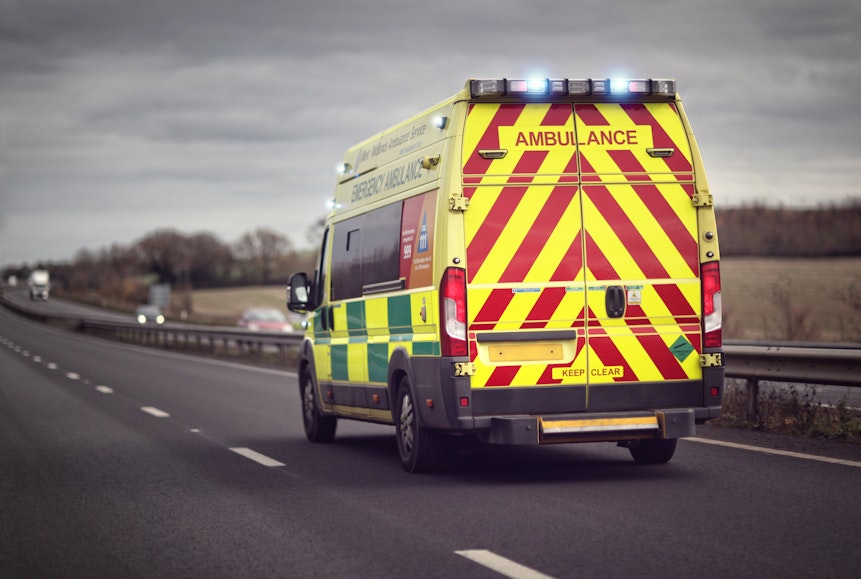What to do if your Customer has an Allergic Reaction: Full Guide

No matter how prepared you are, no matter how strict your procedures are, an accident might happen and your customer might have an allergic reaction. What matters in this instance is the response and ensuring the customer is safe and gets the help they need.
Back in January we began our 4 part series “What to do if your customer has an allergic reaction to your food”, to educate those in the foodservice industry of the actionable steps to take in the event of a worst case scenario of a customer experiencing an allergic reaction to particular food allergens.
We spoke to a number of food service and allergy experts as well as food bloggers about how Caterers can best respond to an allergic reaction. It should also be noted that people might not always react to the 14 major food allergens, there a number of new emerging allergens that you should be aware of.
But in this special edition we're going to show you all the parts together, in one go, so you can take in all the expert advice on what to do if a customer has an allergic reaction in your food business.
But first, a quick refresher on the basic steps to follow if someone suffers an allergic reaction...
What should I do if a customer has an allergic reaction?
- Put the customer in a comfortable position and call 999, if they’re experiencing a severe reaction, state that the individual is having an anaphylaxis allergic reaction.
- Locate and administer adrenaline auto injectors
- Keep the customer where they are, do not move them.
- If there is no sign of life, commence cardiopulmonary resuscitation (CPR).
- Make sure someone stays with the individual until the ambulance arrives.
- Inform an emergency contact of what has happened to the individual.
Now lets hear from the food allergy experts...

What to do if a Customer has an Allergic Reaction to your Food by Caroline Benjamin, Founder of Food Allergy Aware
Caroline works with all kinds of food service businesses from health care trusts to high street restaurants and cruise liners, helping them shape their allergen processes and policies through consultancy, training, events and workshops.
What Caterers should do during a customer allergic reaction
“Your first priority is to ensure your customer receives fast medical assistance. Call 999 for an ambulance and then check that the customer has an adrenaline injector that they are able to self-administer, or your first aider is present to assist administering.
If the reaction is severe, state that it is an anaphylaxis reaction. The customer may not want to cause a fuss but it is best to call an ambulance as they can deteriorate quickly in the event of anaphylaxis.
If an adrenaline injector is administered the customer should always go to hospital to be reviewed and assessed as ‘late phase’ reactions can occur up to 2-6 hours later. Administer the adrenalin injector in the outside of the person’s thigh, if you need to administer a second injector it should be in the other leg. The person should not be moved and where possible lay flat with legs raised until the ambulance arrives.”
What Caterers should do after a customer allergic reaction
“There are a number of areas to consider. Once the customer is stable and under medical care you need to review your internal processes. It may be that you take a contact number and follow up once treatment has been received… Here are some areas to consider:
- Who took the order?
- What details were given at the order booking stage?
- Was an allergen request submitted? (It maybe the first time this person has had a reaction)
- If the food is available seal and store safely, labelling as appropriate as there may be a visit from the local EHO who will ask for the sample if available.
- Inform your head office according to your set procedures and complete forms to ensure that details are documented.
- All staff who were part of the customer's journey should write up statements.
If you have the customer’s contact details, follow up with them to understand what happened and to see if there was any miscommunication, have a set list of questions for allergic incidents, this will help in capturing all the information without any back and forth needed.
On completion of the enquiry, a review should be carried out by key management staff and the kitchen to understand what happened and how this can be prevented going forward. If there is an environmntal health officer (EHO) enquiry it is better that you have all the details and cooperate fully and show that you have put processes in place to prevent such an incident recurring as appropriate to the outcome.
We would recommend logging all incidents with headings and descriptions (and sections relating to reasons for the incident happening) in either your online management system or an Excel spreadsheet, so you can understand if there is a pattern occurring. Here are some examples of categories/descriptions:
- Staff communication
- Information NOT on the booking form/reservation
- Information not given to manager/server
- Server did not acknowledge and put on order ticket
- Chef ignored the allergen alert
- Customer communication
- Customer did not inform venue of allergy
- First time customer had reaction
- Kitchen cross-contamination
- Food prepared on incorrect boards
- Staff did not clean area
- Mislabelling
- Food stored incorrectly
- Label missing on supplies
You should encourage your staff to report near misses or customer feedback on potential issues and they can be logged in the same way as above. It should be noted that Pret-a-Manger were warned at least 6 times about a potential issue occurring with sesame flour not clearly labelled on their baguettes, but this feedback was not recorded.
Natasha’s Law has been set up to ensure correct labelling is available on all PPDS food products but it was highlighted by the coroner to monitor feedback which should include near misses in food management safety systems. Had the feedback been noted and the Head Office informed. a recurring pattern would have appeared, and could have potentially saved Natasha Ednan-Laperouse from eating the baguette.”
Customer Allergic Reactions - further steps for Caterers
“Food Allergy aware has developed a reporting form, and if you would like more information please contact consultancy@fatc.co.uk or visit Food Allergy Aware's Website foodallergyaware.co.uk here.
The Reluctant Allergy Expert book from allergy blogger Ruth Holroyd of What Allergy Blog is another useful resource that tells of experiences of living with life-threatening allergies, and includes guidance on areas such as adrenaline pens, eating out, holidays when you have allergies – this book is useful for those in the hospitality industry as it explains how it feels from the perspective of an allergy sufferer.”
What to do if your customer has an allergic reaction by Ruth Holroyd, author of The Reluctant Allergy Expert and founder of What Allergy blog
As author and creator of educational allergy resources, Ruth raises awareness and covers topics surrounding allergies, eczema and asthma. She’s also a FreeFrom Food Awards Judge and has worked with Foods Matter, BSACI, the BBC and ITV.

“It’s every chef or waiter’s worst nightmare. ‘I think I’m having an allergic reaction!’ As an allergic diner who has been sitting at the table feeling the onset of an allergic reaction on a number of occasions, I’ve seen different ways of dealing with the situation. I know it’s terrifying from both sides but handling it correctly can have a significant impact for all concerned. At this point, it’s just about the person having the reaction and getting the best outcome for them.
What to do when a customer is having an allergic reaction in your business
- Call 999 – Do this before anything else. If you have enough staff, have someone sit with the person and their family. Talk to them, keep them informed. Let them know you are doing everything you can to find out what happened.
- Stay calm and inject adrenaline - Ask them if they carry adrenaline and whether they have used it yet. They may be confused and scared and not be acting rationally. If they are on their own, they may need you to step in and encourage them to use their adrenaline to be on the safe side. If the adrenaline does not appear to work, encourage them to inject their second pen, if they have one, into the other leg! This is better for getting the medication into the system.
- Keep them seated - Never let the person walk. Don’t move them, tell them to stay calm, sitting where they are. Walking can make a reaction worse. Paramedics should not get the patient to walk, a wheelchair or stretcher would be preferable.
- Find out what happened - If they are with friends or family, you can start to calmly understand what has happened. If you don’t already know, find out what they are allergic to and note this down. They may know what they think the person has reacted to.
- Keep the evidence - Make sure you have the plate of food and isolate it in case you need it for testing.
- Take notes - Note times, symptoms, names of who is there. Talk to the person if they can speak. Check how they are feeling regularly so you can give this information to the paramedics when they arrive.
- Get the contact details - In my experience this rarely happens. It would make such a huge difference to me if it did. Regardless of where the blame lies, a simple email or text message to say you are thinking about them, and hope they recover swiftly and are okay would be a very kind thing to do. Maybe that’s not advised in these situations for legal reasons as it’s never happened to me, but I’ve often thought it would be a good thing.
- Debrief ASAP - When the person has gone to hospital or safely home, speak to all staff who were involved as quickly as possible to work out what happened. The sooner this is done the better as people forget, especially if they are worried they made a mistake. Make it clear this isn’t about blame but learning and improving procedures after mistakes are made.
What do if you are experiencing an allergic reaction in a restaurant or other food establishment
If you have allergies the chances are this has happened to you. The worst reaction I had was also the one where the staff showed no compassion or care. I think that was because of a lack of training and confidence to deal with the situation but it left me feeling ignored, disrespected, angry and very disappointed.
Here are few things you should do:
- Evidence - Always take a photograph of your food before you start eating. Not so you can post it on Twitter, but so you can remember what you ate and see what it looked like, it might help when trying to work out what caused a reaction.
- Always inject - If in doubt, inject your adrenaline. You won’t do any harm in doing this and it could save your life.
- I have an Allergy Action Plan with me at all times. This is a document that details what my reactions look like for me, my common symptoms and what medication I have with me. It talks the person through how to handle the reaction so it can be helpful.
- Engage staff - Right from the start of booking I try to make myself seem as human, normal and reasonable as I can. I will always contact a restaurant beforehand and also visit in person too before going. I want them to engage with me as a person, to understand my fears and allergies and to care about helping me.
- Stay calm - Stay seated, do not move! This is so important. You should not get up and walk if you are having an anaphylactic reaction. It can make things speed up and lead to a worse reaction.
- Take photos of your reactions - Any swelling, rashes etc. And make notes of the time you started to react, the time passed, what you think you reacted to. Even really basic notes made at the time can be so helpful as you may not remember after a reaction. I find I have a lot of brain fog after an anaphylactic reaction and often remember very little. Having photographs will show you what time things were happening.
- Get tests - If you go to hospital, ask them to test for the suspected allergen. These tests are sometimes not done and they can be really helpful for you in understanding and unpicking what went wrong. It can be a new allergy or an allergy that has worsened with time. If you don’t test you can never be sure.
Allergic reactions - why it's important for Caterers and customers to help each other
It takes courage to put your trust in a restaurant and its staff, but we both want the same outcome. The restaurant wants every customer to enjoy the experience and return and the allergic person wants to have a safe meal with the minimum of fuss. So when things go wrong the same applies. Be kind, be calm and act fast! Both the restaurant and the diner have a responsibility to be open, honest and up front. When we can all see allergies as just a normal part of the job I really believe it will get easier to avoid mistakes, on both sides.”
Visit Ruth’s blog What Allergy, here and make sure to read her book The Reluctant Allergy Expert.

What to do if your customer has an allergic reaction by Lindiwe Lewis, Creator of The Allergy Table Blog
Lindiwe has created a community through her blog for those with allergies, it’s a safe space where she shares reviews of food, restaurants, delicious recipes and personal stories about living with allergies.
What Caterers should know about people with allergies
“Please note - I am not a doctor, or a specialist - this is only coming from experience and what I have been told.”
The main piece of advice I would give to all establishments is - allergy reactors are people. We are risking our lives by walking into your restaurant or ordering your food. Yes for you, you may see it as a nuisance, but for us it is a life and death risk. We did not ask for allergies, but just because we have them doesn’t mean we have to stay inside and cook for ourselves 24/7 for the rest of our lives. Treat us with respect, kindness and patience - and stay with us if we are fighting for our lives, because of the food we trusted you with. It is the least you can do.”
What to do if someone is having a serious allergic reaction in your restaurant or food business
- No movement: Do not make them walk or move; lie them on the ground and wait for the paramedics to come. They should also track down the reactor's emergency plan.
- EPI FIRST, EPI FAST: Make sure that somebody has called an ambulance and administered the adrenaline.
- Fear: The allergy reactor will be scared and panicked - everyone around them needs to remain calm, a panic attack will not help the situation (for both parties).
- Explain that help is on the way: Have someone stay with them at all times, explaining what is happening and that they are going to be okay. (From personal experience) My eyes are always swollen shut in a serious reaction and having my friends there or a staff member telling me what is happening has relieved my stress in every reaction - I know I am not alone.
- Stay with the individual having a reaction: I hear a lot of the times that the staff have left the reactor and moved on with business - this is not a duty of care. One staff member should be with the reactor (hopefully their server or a manager) and explaining what has happened to the paramedics.”
What to do if you have allergies and you’re ordering a takeaway
- “I don’t order takeaways because the chef or staff cannot see me, so they can’t see me as a human being. I also live alone, which adds to the fear of having a reaction. But here are my tips if you are home alone and ordering takeaway:
- Always have your epipen and phone near you when ordering in.
- Stick to what you know: If you eat at this restaurant, order what you normally order; if this is the first time eating at the restaurant, order a meal that is simple and something you would get at a restaurant normally.
- Communicate your allergies, every time: Make your allergies clear and detail the severity. Ask them to tell you the ingredients of the dish, so you can know exactly what is in your food.
- Tell a friend or family member: Tell someone that you are ordering in and where the food is from. Ask them to call you in 20 minutes if they haven’t heard from you.

What Caterers and customers should remember about allergic reactions
“Reactors: Make sure to call the restaurant if you have had a reaction, and discover why and what practices they have in place whether you eat in or at home. If they are supplying you with food, they need to do their due diligence in making that food safe. Remember to tell the staff about all of your allergies, be kind but direct and don’t be embarrassed. Remember to carry your 2 epipens in a place where the staff or whoever you are with can find them easily.
Establishments: To go above and beyond when it comes to takeout, call the customer who informed you of their allergy 30 minutes after receiving the food, to check in (like you would in a restaurant). Be transparent, we don’t want to have a reaction anymore than you want us to. Inform us of the ingredients, and please follow the correct steps if we do have a reaction.”
You can Visit Lindiwe’s blog The Allergy Table, here.
What to do if your customer has an allergic reaction by ARK Solutions
With over 40 years experience in the pharmaceutical sector, ARK solutions provide life saving support to schools in the form of affordable treatment kits, developed in partnership with Allergy UK and Arcadia Medical, to those at risk of anaphylaxis or asthma attacks.
Allergic reactions in schools
“Anaphylaxis-type reactions to food are very rare within the school environment - however, severe reactions from food do happen. Schools have a duty to be able to care for pupils with allergies and provide emergency care for a child having anaphylaxis.
Schools should have set protocols in place for their allergic children which should include a written Allergy Action Plan (for each child) - available as a free download from the British Society for Allergy & Clinical Immunology (BSACI) and contain all the steps and procedures to follow in the event of anaphylaxis. They also contain important information about the child’s allergies and what medication they are currently taking, forming the basis of how the child is cared for at school regarding his or her allergy. A child’s Allergy Action Plan should be updated and reviewed regularly in conjunction with regular communication with the school.”

Food hall and classroom procedures to prevent allergic reactions
“The risk of coming into contact with a food allergen will always be present on the school’s premises, but this will clearly be at its greatest in areas where food is consumed such as a food hall. Due to the current COVID-19 social distancing measures this may well now include the classroom. The rules and procedures that apply to the food hall will now apply to the classroom which would include but not limited to:
- Prepare food separately for children with a food allergy, and clean cooking equipment and utensils thoroughly.
- Educate children on the dangers and symptoms of severe allergies.
- Ensure all staff know which children suffer with severe allergies and how to administer Adrenaline Auto Injectors (AAI’s) correctly.
- Clean all surfaces regularly.
- Discourage the sharing of food between children.
- Promote good hand washing before and after meals."
What to do if anaphylaxis occurs in a school
“In the event of anaphylaxis, as mentioned in the BSACI action plan, you should:
- Lie the child flat with legs raised or sat down comfortably and immediately dial 999 stating that the child is having an anaphylaxis allergic reaction.
- Administer spare autoinjectors before the child's own autoinjector into the mid outer thigh.
- Commence CPR if there are no signs of life.
- Stay with the child until the ambulance arrives, keep them lying down.
- Phone the child's parents or emergency contact.
- Recent legislation regarding anaphylaxis in schools
“A relatively recent change in legislation (2017) now permits schools to purchase ‘spare’ AAI(s), without a prescription, for use on children that have been diagnosed of being at risk of anaphylaxis or have been prescribed an AAI(s). The “spare” AAI can be used if the child’s own prescribed AAI(s) are not immediately available (for example, because they are broken, out-of-date, have misfired or been wrongly administered).
Written parental consent and medical authorisation must be obtained for the schools “spare” AAI to be used on a child. Schools can purchase spare adrenaline auto-injectors from a pharmacy. Alternatively, at ARK we have developed anaphylaxis emergency kits which contain 2 x adrenaline auto-injectors, additional medication (salbutamol inhaler and spacer device) and supporting information for the emergency treatment of anaphylaxis in schools. ARK kits are portable and can also be wall mounted in high-risk areas such as food halls.
Additional supporting information and educational materials for schools’ parents and children can also be found on the ARK In Schools website.”
And now for some things everyone should know about allergies...
What are the symptoms of an allergic reaction?
Mild:
- Sneezing
- Itching
- Wheezing, chest tightness, shortness of breath, coughing
- Raised, Itchy Red Rash, Hives
- Swelling of the lips, tongue, eyes or face
- Tummy pain, feeling sick, vomiting, diarrhoea,
- Dry, red and cracked skin
Severe (Anaphylaxis), the symptoms above as well as:
- Swelling of the throat and mouth
- Difficulty breathing
- Lightheadedness
- Confusion
- Blue Skin/Lips
- Collapsing and losing consciousness
What are the main allergens?
There are 14 major food allergens recognised by the Food Standards Agency (FSA). These are
How Erudus can help you manage Allergens
These tips from figures from across foodservice is vital and actionable should this ever happen to one of your customers and here at Erudus we offer a number of tools and solutions for caterers that help you understand find answers and understand your products and what they contain so you can be clear on allergens and give your customers the answers they need, whenever you need them. Discover how Erudus can help you keep your customers safe, here.










